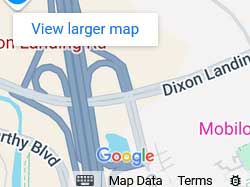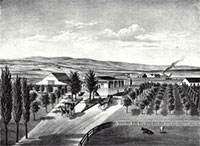People and Places:
Street Name Stories
Dixon Landing Road

Dixon Landing Road, and Dixon Road, its continuation east of Highway 880, were named for Matthew Dixon.
Milpitas City Councils Renames Part of Dixon Landing Road
This historical topic was chosen after the recent decision by the Milpitas City Council to rename part of Dixon Landing Road to Barack Obama Blvd. There has been considerable community discussion about this decision.
Who Was Matthew Dixon, for whom Dixon Landing Road was named?
Born in 1828 in Virginia, Matthew Dixon’s parents moved their family to Jackson County, Missouri, in the late 1830s.
Three days after his 21st birthday, Matthew migrated to California to mine gold in Hangtown (Placerville) briefly, after which he bought land and settled in our area.

In 1861, Matthew Dixon bought 600 acres of land, on both sides of the Santa Clara/Alameda county line, for his farm. The area was then known as Harrisburg.
Matthew Dixon built his house on the eastern side of the then-Mission Highway, and made a road down to the waterfront. He and his neighbor, Captain Valpey, built rough docks for flat-bottomed, two-masted scow schooners1 to load hay, and grain from the Milpitas and surrounding areas.2
He had a major impact on the prosperity of all the local farmers. Please join us to find out about more how he did this.
Joseph Ehardt, Speaker
Our featured speaker will be Joseph Ehardt, Milpitas Historical Society’s docent on our annual tour of historic sites in Milpitas and docent in the Society’s Educational Outreach Program. He last spoke in 2015 on the 1915 Panama-Pacific International Exposition held in San Francisco that was celebrating the completion of the Panama Canal. This month he will speak about Matthew William Dixon, the pioneer after whom Dixon Landing Road and Dixon Road are named.